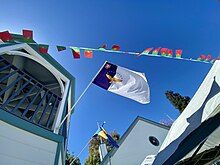The "Hymn of the Azores" (Portuguese: Hino dos Açores) is the official regional anthem used during some ceremonies in the Portuguese autonomous region of the Azores. For official purposes, the national anthem, "A Portuguesa", is always used during government events, in sporting venues, and during other civic ceremonies.
| English: Hymn of the Azores | |
|---|---|
 | |
Regional anthem of | |
| Lyrics | Natália Correia, 19 May 1979 |
| Music | Joaquim Lima (1890) Original Teófilo Frazão (1979) Adaption |
| Adopted | 21 October 1980 |
| Audio sample | |
Piano version | |
History edit
The original song was composed by Joaquim Lima, a musician and director of the Philharmonic Band of Rabo de Peixe, the Filarmónica Progresso do Norte, in the 1890s, when a movement for autonomy was growing within the archipelago. It was first played by the band on 3 February 1894 and was originally titled "Hino Popular da Autonomia dos Açores" ("The Popular Hymn of Autonomy for the Azores").
On the same day, António Tavares Torres, President of the Executive of the municipality of Ribeira Grande, accompanied by a group of friends from the Filarmónica Progresso do Norte, went to Ponta Delgada to play the hymn in public. After playing for the members of the Autonomous Electoral Commission, as it became late, they gathered at the Campo de São Francisco with a large group of autonomy supporters and crossed the streets towards the Centro Autonomista, where they participated in a rally for the forthcoming general elections. During this rally, several speakers promoted the autonomic agenda, including: Caetano de Andrade, Pereira Ataíde, Gil Mont'Alverne de Sequeira and Duarte de Almeida.
On 14 April 1894, Gil Mont'Alverne de Sequeira, Pereira Ataíde and Duarte de Andrade Albuquerque were elected deputies under the Autonomist banner and celebrated their success with a march through the streets of Ponta Delgada accompanied by Philharmonic Bands playing the "Hino da Autonomia".
On 9 March 1895, the philharmonic bands also played the "Hino da Autonomia" in the municipal square of Ponta Delgada during the festival marking the promulgation of the 2 March 1895 Decree establishing limited autonomy for the Azores.
Originally, Lima's anthem had no lyrics, but as a function of political evolution, many unofficial regional lyrics were written to support local autonomy. The first recognized hymn became the anthem of Partido Progressista Autonomista ("Autonomous Progressive Party"), led by José Maria Raposo de Amaral, in São Miguel. Its lyrics were composed by the poet António Tavares Torres, a native of Rabo de Peixe and political militant of the Progressive Party.
Modern anthem edit
Following the legal autonomy of the Azores, the Regional Government asked Azorean poet Natália de Oliveira Correia to compose official lyrics for the anthem. The government also adopted Teófilo Frazão's arrangement of the original melody as the official version of the anthem.
Approved by the Regional Assembly on 19 May 1979,[1] it was promulgated and adopted on 21 October 1980 as a ceremonial anthem of the Regional Government.[2]
The official version of the "Hymn of the Azores" was performed publicly on 27 June 1984 by students of the Colégio de São Francisco Xavier, during a ceremony that reunited the President of the Azores (João Bosco da Mota Amaral), members of the Regional Government, and various official attendees. It was sung by 600 children, wearing blue skirts/pants, white shirts and yellow handkerchiefs, and it was directed by professor Eduarda Cunha Ataíde.
The official anthem, "A Portuguesa", with which the "Hymn of the Azores" has no legal standing, is used in all governmental capacities, in sporting venues, and during other civic ceremonies.
Lyrics edit
| Portuguese original[2] | IPA transcription[a] | English translation |
|---|---|---|
I |
1 |
I |
Notes edit
- ^ See Help:IPA/Portuguese and Portuguese phonology.
- ^ Occasionally written este ("this").[3]
- ^ Occasionally written Açoriano ("Azorean").[4][5]
References edit
- ^ "Decreto Regulamentar Regional n.º 13/79/A" (PDF). Lisbon, Portugal: Diário da Republica. 18 May 1975. p. 3536. Retrieved 25 August 2010.
- ^ a b "Decreto Regulamentar Regional n.º 49/80/A" (PDF). Lisbon, Portugal: Diário da Republica. 21 October 1980. p. 3536. Retrieved 25 August 2010.
- ^ "Edição 2502 - 05 de junho de 2019" (PDF). Portuguese Times. 2019-06-05. p. 24. Retrieved 2022-01-01.
- ^ "Decreto Regulamentar Regional Nº 49/1980/A de 21 de Outubro". jo.azores.gov.pt. PRESIDÊNCIA DO GOVERNO REGIONAL DOS AÇORES. 1980-10-21. Retrieved 2022-01-01.
- ^ "REGULAMENTO DO CONCURSO - Jovem Autonomia" (PDF). portal.azores.gov.pt. 2021-04-13. p. 5. Retrieved 2022-01-01.
- Faria e Maia, Francisco de Ataíde Machado de (1994). "Novas Páginas da História Micaelense". Jornal de Cultura (2 ed.). Ponta Delgada, Azores: 390–391.